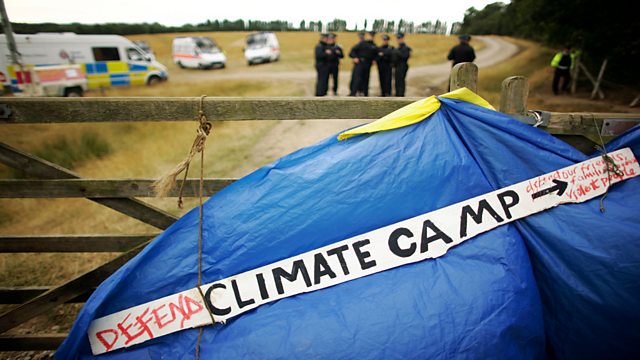The Art of Protest
Dire warnings have been made from leading charities and officials that environmental campaigners are under threat from new rules and regulations. Tom Heap finds out what's at stake.
Who really makes the biggest difference on climate change - those living on the edge or those working firmly within the system? Tell us about your experience of environmental campaigning via the Costing the Earth Facebook site (link below).
A recent Christian Aid survey found that 93 per cent of people think everyone in the UK should have the right to peaceful protest, 50 per cent think the police are too heavy handed, and 18 per cent are put off protesting in the future due to heavy-handed policing. Costing the Earth finds out about those who continue to campaign on the planet's behalf; is it really getting harder for them to make an impact on how we and our governments behave?
Mark Carter has been on hunger strike for over 46 days to highlight the plight of the seal. Some might see his actions as mad, but for Mark this is the only way to affect the government's proposed marine bills. During the last 10 years the common seal population has declined by a third but they are still being killed and for Mark, at least, the only solution is a ban on these culls. What effect will 500 signatures have against the interests of the fishing industry, and, whatever the results, how will he react?
Jonathan Porritt recently resigned his post at the Forum for the Future with the dire warning that, 'A combination of political paralysis, corporate vested interest and our conservative-co-opted media' alongside 'basic entitlements protecting the rights of dissenting voices being eroded' mean tough times for green activists.
The recent G20 protests saw some of the most draconian police tactics for some time. Using laws intended to prevent terrorists in the wake of 9/11 like Stop and Search, green activists have often found themselves at the front line of human rights issues. At the same time, the government's recent moves to change planning laws and rush through proposals for wind farms and nuclear plants via the Infrastructure Planning Commission quango could mean that contentious plans go ahead before activists have time to launch protests.
Is it really getting harder for people like Tim, a regular at Climate Camp who has been informed that his photo and details are on police file, to affect change?
Equally important is whether the long-used methods of mass camps, extreme acts and even advertising really have the impact that changing policy and people's behaviour requires. A recent report from the World Wildlife Fund suggests not. Could Whitehall workers or investment bankers be making a bigger difference without even trying, and if these methods haven't worked, what next?
We follow Mark and Tim's stories to find out what one individual's efforts can achieve and look at the big protests of recent years to find out what the future of green activism might hold.
Last on
More episodes
Previous
Next
Broadcasts
- Mon 12 Oct 2009 21:00麻豆社 Radio 4
- Thu 15 Oct 2009 13:30麻豆社 Radio 4
What has happened to the world's coral?
Podcast
-
![]()
Costing the Earth
Fresh ideas from the sharpest minds working toward a cleaner, greener planet



